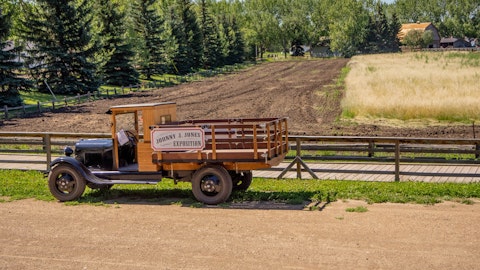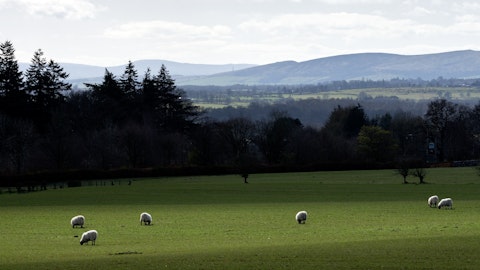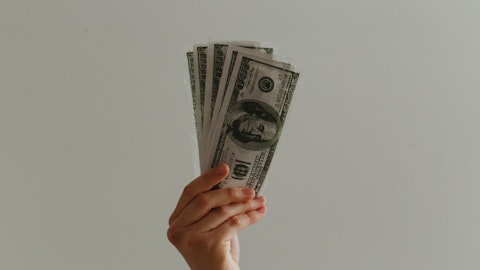David Gladstone: Also, if you remember, we do value our properties every quarter. And when we get these third-parties in, and they have been impacted, the pricing for all the farms has been impacted about high interest rates. And so as a result, prices of farms have been impacted by the fact that you can’t borrow cheap money now. And so you can’t do the deals that you wanted to do. And so those properties and those valuations are taking into account the very extremes that are going on in the interest rate marketplace now. If the interest rates come back down, you may see a big bump in our valuations, because right now, their valuation people are saying, well, you can’t sell it for that per day. And so that’s what we are waiting on as those people that run the Fed, that a guy try to get off the dime and stop increasing rates. When they do as they do each time that happens, things will change in the valuations.
Mike Albanese: Yes, that was a great point. That was really the basis for my question because I am surprised or – surprised for lack of a better term at how well the NAV has held up, given how quickly and dramatically interest rates have gone up. But obviously, you see that affect you in kind of a couple of different places. So, no, that makes sense, that’s very helpful. Thank you. And that’s it on my end. Appreciate you guys taking my question.
David Gladstone: Okay. Latanya, you got – anybody wants to ask another question?
Operator: Yes. The next question comes from John Massocca with B. Riley. Please proceed.
John Massocca: Good morning.
David Gladstone: Good morning.
John Massocca: So, just kind of participation rents in the quarter were kind of down about 20% year-over-year, I know you didn’t really give guidance for participation rents. But as we kind of think about 4Q, which is obviously a big quarter, from a participation rent perspective is –should we expect a similar kind of downtick or is there something kind of unique about the third quarter?
David Gladstone: I would say it’s difficult to analyze the participation rent amounts in any one single quarter, because for example, last year, we may have gotten information from properties A, B and C, and this time, we get properties from B, C, and D. So, it’s not always a one-to-one match. So, I think we really need to be able to be looking at it on a kind of a full year basis, so that we are really capturing the full population. As far as where Q4 is going to come in, we are still gathering data. But I know in the past, we have said that on an annual basis, we do expect the 2023 participation rent amounts to come in somewhere between the ‘21 amount of slightly north of $5 million and the ‘22 amount of close to $7 million. Hopefully, we are on the upper end of that range. But we are still gathering data and finalizing the numbers vetting the information on our end.
John Massocca: Okay. That’s very helpful. And then in terms of kind of some of the leases where you are either self-operating or you have had some tenant issues. I mean is there any of that that wasn’t really reflected yet in the 3Q numbers and will kind of flow through 4Q or any kind of immediate recovery? Just how should we kind of think about that impacting NOI or maybe any other line items that some of the self-operating stuff might be going through?
David Gladstone: Everything has been captured so far. The self-operated properties and they haven’t been – we didn’t record any revenue from them in Q3. The tenants that were on a cash basis, once well, assuming they do eventually return to full accrual status, get back on GAAP rents. You will see a small increase in GAAP lease revenue just from capturing data, the straight line effect again, just as we reverse that, I think back in Q1. But it’s – we are still – we still want to see more from those tenants continued on-time rent payments among other factors to before we put them back on accrual status. But of the issues that we have talked about everything has – was fully reflected in the Q3 numbers.
John Massocca: Okay. If you do get something from the self-operated properties back in the beat, you have kind of a one-time hit and then in a quarter out there, the next 12 months or so, or is that just kind of how should we think about the potential impact from that.
David Gladstone: So, the self-operated properties under the costs so far, they have been deferred on the balance sheet as kind of crop inventory. So, once those crops are harvested, the gross revenue – those costs will offset the gross revenues as they come in as cost of sales. And we will just recognize the net amount is in the P&L.
John Massocca: Okay. That’s it for me. Thanks very much.
David Gladstone: Latanya, we got another question?
Operator: Yes. The next question is from Mike Whitaker with Newbridge Securities. Please proceed.
Mike Whitaker: Good morning. This will be brief. I think most of the answers have probably already been given, but I am looking at from an investor standpoint, I used to have LANDO when it went public. I had LANDP before it went public and now it’s public. And as I am talking to all my clients, and it’s down almost 30%. Is there anything outside of interest rates inflation or any of the things that you have been speaking of, that’s caused us to go down roughly 30% since June. And is there any anticipation outside on interest rates going down and inflation going down that might cause these valuations to go back up?
David Gladstone: Well, remember, these securities are first out, so they get in front of the common stock. So, these are guys are in great position. The fact that it’s going down is just the fact that interest rates have been changed by the Fed. And so as a result, you are competing with 5%, that you can get T-bills and 5-year T-bills are wonderful to hold. And these are good properties that are in this things. You just can’t get something as secure as this is, because it has all of our land as the first call on that. So, I can’t believe that people are willing to give up the return, but it’s just pure numbers. What do you want, your piece of property to – I mean your security to generate, and if it’s got to generate more than 5%, that’s absolutely secure, then going to have to do that.
So, the price has to come down. And this is a good reflection also on the people who own land, because they used to get real high prices for their property. And now they can’t get the high prices. And so the only way to get that property sold is to drop the price of the property, something that somebody will pay for. And the same thing is happening with those preferred positions that those and those securities that your clients own. It’s the same thing, they are going to get their dividend. But that’s not enough today, when they can jump out of, well, they can jump out at all the price, but they can sell and get something else to generate just as much income.


